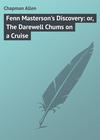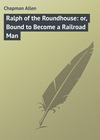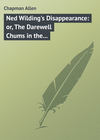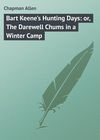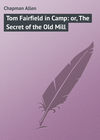Loe raamatut: «Fenn Masterson's Discovery: or, The Darewell Chums on a Cruise», lehekülg 9
CHAPTER XXIV
FENN IS CAPTURED
For several seconds after he had observed the man’s head disappear down the hole in the ledge, Fenn waited. He wanted to see if the fellow had gone for reinforcements, or had retreated. After a minute or two Fenn decided that the man was as much frightened as he himself was.
“I’ll take a look down that hole,” he decided. “I’m not in very good shape for visiting company,” he went on, with a look at his clay-covered clothes, “but I don’t believe those chaps are very particular. I wonder what I’m up against? This is a queer country, with holes in the ground almost at every turn, leading to no one knows where.”
He advanced toward the shaft, down which the man had vanished, and, as he reached the edge, he saw that it contained a ladder.
The ladder was made of tree trunks, with the branches cut off about a foot from where they joined on, leaving projections sticking up at a slight angle, and making a good hold for the hands and feet.
“Well, I s’pose I’m foolish to do this all alone, and that I had better go back to camp and get the boys,” murmured Fenn, as he prepared to descend. “But, if I do, the smugglers may escape, and I’ll lose the reward. There must be an opening at the bottom of this shaft that leads right out on the lake shore. When the boats land the smuggled-in Chinamen, they are probably taken up this shaft, then through the one I slid down, and so into the woods, and from there they are spirited wherever they want to go.”
He looked into the shaft, and listened intently, but could hear no sound. He was surprised to see that the opening, leading down to he could only guess where, was dimly lighted, seemingly in a natural manner. But his wonder at this ceased when, having gone down a little way, he noticed that the walls of the shaft were pierced, in the direction of the lake, with small openings, through which light came.
The shaft, he then saw, was either a natural one, or had been bored, straight down the cliff, and at no great distance from the perpendicular face of it. The sides seemed to be of soft rock, or hard clay, and the tree-trunk ladders were fastened up against the walls by long wooden stakes, driven in deeply. There were several tree trunks, one after another, and from the smoothness of the jutting prongs it was evident that they were often used.
Down Fenn climbed, stopping every now and then to peer through the ventilating and light holes. He caught glimpses of the great lake, that lay at the foot of the cliff, toward the bottom of which he was descending in this strange manner.
“Queer I don’t hear or see anything more of those men I was chasing,” mused the boy as he paused a moment opposite one of the air holes to get his breath. “I wonder what became of the two Chinese and the white chap? Then there’s that man who stuck his head up out of this hole. He looked like a miner, for his hat was all covered with dirt. That reminds me, where’s my hat?”
Instinctively he looked about him, as though he would find it hanging on one of the prongs of the tree-trunk ladder, which might answer as a hat rack. Then he laughed at himself.
“I remember now,” he said. “It flew off when I fell through that clump of fern into the hole I thought led to China. Guess I’ll have to make my bow without my hat.”
He glanced below him. It seemed as if he was at the last of the ventilating openings for, further down, there were no glimmerings of daylight, which was fast waning. Then, as he looked, he caught the flickering of a torch, not far down. It waved to and fro, casting queer shadows on the walls of the shaft, and then the person holding it seemed coming up the ladder.
“Now there’s going to be trouble,” thought Fenn. “We can’t pass on this thing. Either he’s got to wait until I get down, or I’ll have to go all the way back to the top. I wonder if I better yell to let him know I’m here? No, that wouldn’t be just the thing. I’ll try to slip around between the wall and the ladder, and, maybe, he’ll pass me.”
Fenn proceeded to put this rather risky plan into operation. Holding on by both hands to one of the projecting branches he endeavored to swing himself around. The man with the torch was coming nearer and nearer.
Suddenly Fenn’s hold slipped. He tried to recover himself but without avail. The next moment his hands lost their grip and he went plunging down into the darkness below, faintly illuminated by the smoking torch. Then he knew no more.
When Fenn came to his senses it was only with the utmost difficulty that he could recall what had happened. He had a hazy recollection of having been in some dark hole – then a light was seen – then he slipped – then came blackness and then —
He tried to raise himself from where he lay, and a rustling told him he was reclining on a bed of straw. By the light of a torch stuck in the earthen wall of what seemed to be a cavern, Fenn could make out the shadows of several men, grotesquely large and misshapen, moving about. From the distance came a peculiar noise, as of machinery.
Fenn’s brain cleared slowly, though from the ache in his head, he knew he must have had quite a fall. He raised himself on his elbow, and gradually came to a sitting position. He drew a long breath, and started to get up.
As he did so, he felt some one place his hands on his chest, and push him back, not rudely, but with enough firmness to indicate that he was to lie down. Instinctively he struggled against what seemed to him a dim shape in the half-darkness.
“Lie down,” a man’s voice commanded. “You’ll be all right in a little while. You had quite a fall.”
“What’s the matter? Where am I? Who are you?” asked Fenn.
“That’s all right now, sonny,” was the reply in such soothing tones, as one sometimes uses toward a fretful child. “You’re in safe hands.”
“Has the kid woke up?” called a voice from the blackness beyond the circle of light cast by the torches.
“Yes,” answered the man who had made Fenn lie down.
Following the words there was a sudden increase in the illumination of the cavern, and Fenn saw a big man approaching, carrying a torch. With him were several others. One of them had a rope.
“Are you – are you going to make me a prisoner?” asked Fenn, his heart sinking.
“That’s what we are.”
Just then another man flashed a torch in the boy’s face. No sooner had he done so than he called out:
“Great Scott! If it isn’t the very kid I chased!”
Fenn glanced quickly up and saw, standing before him, the man with the sinister face – the man who had pursued him at the elevator fire. Beside him was a man with a peculiar cast in one eye, and Fenn knew he was the fellow who had listened to the conversation of the chums in the railroad car.
CHAPTER XXV
AN UNEXPECTED MEETING
Along the trail, which they had thus suddenly come upon, fairly ran Frank, Ned and Bart. Now that they were sure Fenn was ahead of them, though they could not tell how long since he had passed that way, they were anxious to find their chum as soon as possible.
“It looks as if Fenn was chasing the Chinese and the white man, instead of them being after him,” suggested Ned.
“Unless they are leading him with a rope,” remarked Frank. “In that case he would be marching behind.”
“Well, I’ll bet they’d have a fine time making Fenn march along with a rope on him,” said Bart. “He’d lie down and make ’em drag him. That would be Fenn’s way.”
“Unless he’s too sick to make any resistance,” replied Frank, who seemed to take a gloomy view of it.
“Well, there’s no good wasting time talking about it,” declared Bart. “What we want to do is to find Fenn. Then we’ll know exactly how it was.”
“That’s right; save our breaths to make speed with,” added Ned.
Though the boys were not lagging on the trail, they increased their pace until they were going along at a dog trot, which carried them over a considerable space in a short time, yet was not too tiring. They caught occasional glimpses of the marks left by the feet of the Chinese and the white man, as well as prints of Fenn’s shoes.
“There they go, up that hill!” exclaimed Ned, who, for the time being, was in the advance.
“Who? The men?” called Bart quickly.
“No, the footprints. Come on,” and he led the way up the little hill, up which Fenn had hurried the day previous, with such disastrous results. Fortunately the pace was beginning to tell on Ned, and, as he reached the summit, and started down the other side, he slowed up. It was to this circumstance that he avoided stepping right into the hole of the shaft, down which Fenn had taken that queer-sliding journey.
“Look here!” yelled Ned, so excitedly that his two companions fairly jumped up to gain his side, thinking he must have come upon either Fenn or one of the men. “Somebody has fallen down that hole!”
That was very evident, for the fresh earth on the edges, the scattered and torn clumps of fern, and the general disturbance about the mouth of the pit, showed that all too plainly.
“See!” suddenly exclaimed Bart. “There’s his hat!” and, turning to one side he picked it up from the ground, where it had fallen when poor Fenn took his tumble. “This shows he was here.”
“We were sure enough of that before,” said Frank, “but it certainly does seem to indicate that Fenn went down there. I wonder whether he fell, or whether those men thrust him down?”
Bart threw himself, face downward, close to the edge of the hole. He looked carefully at the marks on the edges. Then he got up and began looking about in a circle. Finally, he walked back some distance down the hill.
“I have it!” he finally announced.
“All right, let’s have it and see if we agree with you,” spoke Ned.
“Fenn came up this hill all alone,” declared Bart. “If you had looked closely enough you could see that the footprints of the Chinese and the white man go around the base of the hill to the right. Probably they made a turn, when Fenn wasn’t looking. He thought they went up the hill. He hurried after them, and stepped right into this trap. Probably it was covered over with leaves or grass, and he couldn’t see it, until it was too late. That’s my theory.”
“And I believe you’re right,” declared Frank. “It sounds reasonable.”
“Then the next question is; what are we going to do about it?” inquired Ned. “No use standing here discussing what happened, or how it happened. What we want to do is to get busy and rescue Fenn.”
“That’s the way to talk,” declared Frank.
“Wait a minute,” suggested Bart. Once more he got down close to the hole, and peered into the depths.
“See anything?” asked Ned.
“There a way to get down,” replied Bart, after a moment.
“How; a ladder?”
“No. Ropes. See, there are cables fastened to the sides of this shaft, and it looks as if they had been used several times.”
Bart reached down and got hold of a clay-covered rope, one of those which Fenn had tried so vainly to grasp.
“That’s funny,” remarked Frank. “Looks as if this was a regular underground railway system.”
“I’ll bet that’s what it is,” cried Ned. “This must be one of the means whereby the smugglers get the Chinamen ashore. Why didn’t we think of it before? Let’s go down there. We can easily do it by holding on to the ropes.”
“It’s too risky,” decided Frank. “There’s no telling what is at the bottom.”
“But we’ve got to save Fenn!” exclaimed Bart, who rather sided with Ned.
“I know that, but there’s no use running recklessly into danger. We can’t help him that way. If he’s down that hole, or in the hands of the smugglers, we can do him more good by keeping out of that pit, or away from the scoundrels, than we can by falling into their hands. Fenn needs some one outside to help him, not some one in the same pickle he’s in.”
Frank’s vigorous reasoning appealed to his chums, and, though they would have been willing to brave the unknown dangers of the hole, they admitted it would be best to try first some other means of rescuing their chum.
“Let’s prospect around a bit,” proposed Frank. “Maybe we can find some other way of discovering where this hole leads to. The lake can’t be far away, and if we can get down to the shore we may see something that will give us a clue.”
“All right, come on,” said Bart, and the Darewell chums started down the hill, in the direction of Lake Superior.
As they emerged upon a bluff, which overlooked the vast body of water, they came to a pause, so impressed were they, even in their anxiety, with the beautiful view that stretched out before them. Under the bright rays of the morning sun the lake sparkled like a sheet of silver.
“I wish we were all safe together again, aboard the Modoc,” remarked Ned, after a moment’s pause.
“Same here,” echoed Bart. “But, if we’re – ”
He was interrupted by a sound off to the left. Gazing in that direction the boys saw, coming along the trail toward them, a man and girl. Something about them seemed familiar.
“Mr. Hayward!” cried Ned.
“And his daughter!” added Frank, in a lower voice.
“Well! Well!” exclaimed the man, whose lucky escape from the automobile accident in Darewell, had led to the boys’ acquaintance with him. “If here aren’t my young friends, the Darewell Chums, come to pay me a visit! I’m very glad to see you, but I thought there were four of you.”
“So there are, father,” interrupted Ruth. “Where is Fenn?” she asked, turning quickly to the three boys. “Is he ill – didn’t he come with you?”
“He’s lost!” replied Frank. “We’re hunting for him.”
“Lost?” repeated Mr. Hayward. “How? Where?”
Frank briefly related what had happened since they had started from Darewell on the cruise to Duluth.
“Well I never!” exclaimed Robert Hayward. “That’s a great story! And the last trace you have of him is down that hole?”
“The very last,” answered Ned, looking at Ruth, and not blaming Fenn for thinking she was pretty.
“This must be looked into,” declared Mr. Hayward. “Lucky I happened to be out here with my daughter. You see I live several miles from here, but to-day, Ruth and I decided to take a little trip. I – I wanted to look at some land I – some property I am interested in out here. I was on my way to it when I saw you boys.”
The man seemed to have a curious hesitation in his manner and his words, and Ruth, too, appeared under some strain. But the boys were too anxious about their comrade to pay much attention to this.
“Come on!” suddenly called Mr. Hayward.
“Where are you going, father?” asked Ruth.
“I’m going to find Fenn Masterson. I think I have a clue that will help us,” and he strode forward, followed by his daughter and the wondering boys.
CHAPTER XXVI
FENN’S ODD DISCOVERY
Mutual surprise showed on the face of Fenn, as well as on the countenance of the man who made this surprising announcement in the cave, where we have left that rather unfortunate youth. The boy, who had been prepared to meet a band of Chinese smugglers, now saw before him the mysterious person, who appeared to have some interest in the affairs of Mr. Hayward, and who seemed to be pleased that misfortune should overtake the man who had recovered from the auto accident near Fenn’s house.
“Well, how’d you get here?” asked the man gruffly, advancing closer to the captive, and holding his torch to throw the light on Fenn’s face.
“Slid part way, and climbed the rest,” answered the lad, who decided to remain as cool as possible under the circumstances.
“Humph! Well, I reckon you know where you are now?”
“I haven’t the least idea, except that I’m under ground.”
“Yes, and you’re liable to stay here for some time. You’ll find, before I get through with you, that it isn’t healthy, out in this country, to pay too much attention to the business of other folks. I’ll pay you back for spying on me. I thought I’d gotten rid of you some time ago, but I see you’re still after me.”
“I’m not after you,” answered Fenn. “I didn’t expect to see you down here. Nor am I spying on you. You’re mistaken.”
“Weren’t you trying to hear what I was saying – the night of the fire – aren’t you in the employ of Robert Hayward?” demanded the man, asking his questions too quickly to permit of any answer.
“I’m not employed by Mr. Hayward, though I know him, and he is a friend of mine,” declared Fenn. “I wasn’t intentionally listening to what you were saying that night, but, when I found you were an enemy of Mr. Hayward, I wanted to know more about you.”
“How do you know I am his enemy?” asked the man.
“From the way you talked. Besides, why did you chase after me, and try to catch us on the Modoc?”
“That’s something for me to know, and for you to find out,” replied the man, with an unpleasant laugh. “You’re too wise, you are.”
“Maybe I’ll find out more than you want me to,” retorted Fenn.
“No danger. I’m going to put you where you can’t do anything for a while, and, after you’ve cooled down a bit, I’ll think of what to do next. Tom, come here,” he called.
A big man approached, and, at a nod from the fellow of the sinister countenance, gathered Fenn up in his arms, in spite of the resistance the lad made. Fenn soon found it was useless to struggle, so he remained quietly in the grip of the burly chap.
“Take him to the inner cave,” directed the man, whom the others addressed as Dirkfell, “and then come back. We need you in getting this last load out. After that we’ll take a rest.”
Fenn tried to see where he was being carried, but it was almost impossible in the darkness. There were several flickering torches, stuck in the earthen walls of the cavern, here and there, and, by the glimmers of them, the youth could see men hurrying to and fro. Some carried picks and others shovels, while some bore boxes that seemed to be very heavy.
“I wonder what sort of a place I’ve gotten into,” thought Fenn. “Maybe it’s – yes, I’ll bet that’s what it is – a gold mine!”
For a moment the thought of this made his heart beat strangely fast. Then cooler reason came to him, and he recalled that the region around Lake Superior contained no gold, though there were mines of other minerals, some quite valuable.
This train of thought was interrupted by the sudden stopping of the man who was carrying him, as though he was a baby. The fellow stooped down, kicked a door open with his foot, and, the next moment Fenn found himself in a small cave, lighted by a lantern hanging over a rough table, around which several chairs were drawn.
“Here’s where you stay until the boss tells you to come out,” fairly growled the man.
Fenn did not reply, and the fellow withdrew, taking care, as the lad noted, to lock the door after him. No sooner was the portal closed, than Fenn began an inspection of the place. He took the lantern and held it close to the door. It was made of heavy planks, and the fastening seemed to be on the outside. As for the remainder of the cave, the walls were composed of hard clay, or harder rock. The place was a sort of niche, hollowed out from the larger cavern.
“Well, I seem to be in a pickle,” observed Fenn grimly. “That comes of prying too much into other people’s affairs, I s’pose. No help for it, however. I’m here and the next question is how to get away. I wish the boys were with me – no, I don’t either. It’s bad enough to be here myself, without getting them into trouble.
“I guess they’ll be surprised when they get back to camp and find me gone. I wish I’d left some sort of a message. They won’t know where to look for me.”
But Fenn did not give his chums credit for their energy. The prisoner made a circuit of his dungeon, and concluded there was no way, at present, of getting out. He readily got rid of the rope that fastened his arms behind him.
“I will just take another look at that door,” mused Fenn, when, having completed his tour of inspection, which did not take him long, he again found himself in front of the portal. He held the lantern up as high as he could. “If I stood on a chair I could see better,” he reasoned. He got one of the rough pieces of furniture, mounted it, and, was just raising the light up to the top of the door when his hand slipped and the lantern fell, smashing the glass, and extinguishing the wick.
“Hu!” exclaimed Fenn, standing on the chair in the darkness. “Lucky it didn’t explode and set fire to the oil. I’d been worse off then I am now.”
He was in total darkness, and was about to get down off the chair, and grope his way back to the table, when a gleam of light, showing through a crack in the door, attracted his attention.
“Somebody is coming,” he said. “Maybe they’re going to let me out. Or, perhaps, they heard the lantern fall.”
But, as he looked, he saw that the gleam was not made by a torch or lantern being carried by someone approaching his dungeon. Instead it came from several torches stuck in the wall of the main cave.
And, by the light of these torches Fenn made an odd discovery. Several men were digging in the sides of the cavern, loosening the clay and soft rock with picks and shovels. They were piling the material in boxes which were loaded into a car, that ran on a small track, and were hurried off, to some place that the boy could not see.
As he watched he saw Dirkfell approach, and, by signs and gestures, for Fenn could not hear at that distance, the man urged the laborers to work faster.
“They’re mining,” thought Fenn. “It must be valuable stuff, too, or they wouldn’t take out such small quantities. And they must be working in secret, or they wouldn’t take all the precautions they do, to remain hidden. There’s something queer back of all this, and I’d like to see what it is.”
Fenn applied his eye closely to the crack in the door. He could see the men gathered about a cavity in the cavern wall, on which they were working, and, from the way in which they pointed at something the boy believed they must have come upon a rich deposit of whatever ore they were mining.
“I wish I was out of this place!” exclaimed Fenn to himself. “If I had the boys here to help me I’ll bet we could escape, and then there’d be a different story to tell.
“There must be an opening, somewhere,” he reasoned. “That air comes from under the door. It’s fresh, so there must be some communication directly with the outer air, from the big cave.”
He stretched out flat on his face, and put his eyes as close as he could to the bottom of the portal. He saw light beneath it, and, jumping up, exclaimed:
“That’s it! I see a way to get out. But I must wait until the men have gone!”
An idea had come to Fenn. The floor of the small cave he was in, was of earth. Between it and the bottom of the door, was quite a space. If he could enlarge this space, it might be possible for him to crawl under the door, and this he resolved to attempt, as soon as it would be safe.
He felt in his pocket to see if his knife was there, and his heart beat more rapidly as his fingers closed on the handle. It contained a large, strong blade, and he thought he could do his digging with it. But it would be necessary to wait until the men got out of the way, and, if they worked in two shifts, this would not occur.
Anxiously Fenn waited. Every minute seemed an hour as he sat there in the darkness, now and then kneeling down to peer under the door, to see if the men had gone. But, every time, he saw them at their queer operations, or taking something from the walls of the cave.
He fell into a doze, to be awakened by the entrance of some one into his apartment.
“Where’s the light?” asked a voice Fenn recognized as belonging to the man who had carried him in.
“It fell and broke,” he answered.
“Humph! Well, I’ll bring another. The boss didn’t give no orders to leave you in the dark. Here’s some grub. It’s supper time.”
“What day is it?” asked Fenn.
“Thursday. Why?”
The boy did not answer. He knew, however, that he had been in the cave a much shorter time than he supposed. It was the evening of the same day he had started to follow the smugglers. Now he appeared to have lost track of them, but he was in the power of a gang as bad, if not worse.
The man brought another lantern, and also some water. The food was coarse, but Fenn ate it with a good deal of relish.
“Guess you’ll have to sleep on the table,” the man went on, as he threw some blankets down. “There’s no bed in this hotel,” and he laughed.
But Fenn was too busy thinking of his plan to escape, to care about a bed. He hoped, now that it was night, the men would stop working. And, in this, he was not disappointed. Some one called a signal through the cavern, and the men, dropping their tools, and taking their torches with them, filed out of sight of the boy, watching from beneath the door.
He wanted to begin his digging at once, but concluded it would be safer to postpone it a while. He was sure it must have been several hours that he waited there in the silence. Then, taking an observation, and finding the outer cavern to be in blackness, he commenced to burrow under the door, like a dog after a hidden rabbit.
The big blade of his knife easily cut into the soft clay, and, working hard for some time, he had quite an opening beneath the portal. He tried to squeeze through, but found he was a bit too big for it.
“A little more and I can slip out,” he whispered to himself.
Faster and faster he plied the knife, loosening the earth, and throwing it back with his hands. Once more he tried and, though it was a tight squeeze, he managed to wiggle out.
“Now!” he mused. “If I don’t run into anybody I can get to the foot of the shaft, and go up that ladder. Guess I’ll take the light.”
He reached back under the door, and got hold of the lantern, which he had placed near the hole, slipping it under his coat so that the gleams would not betray him. Then, remembering, as best he could which way the man had carried him, he stole softly along, on the alert for any of the miners.
He had not gone more than a dozen feet, and had just turned a corner, which showed him a straight, long tunnel, that, he believed, led to the foot of the shaft, when, to his consternation, he heard a noise. At the same time a voice called:
“Hey! Where you goin’?”
Fenn resolved to chance all to boldness. Taking the lantern from under his coat, that he might see to run through the cave, he sprang forward, toward what he believed was the shaft down which he had come on the tree-trunk ladder.
“Stop! Stop!” called someone behind him, but Fenn kept on.
